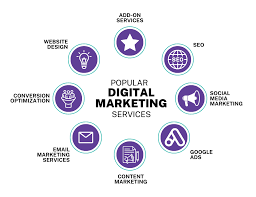The Importance of Web Analytics in Digital Marketing
Web analytics plays a crucial role in the success of digital marketing strategies. By analyzing website data and user behavior, businesses can gain valuable insights that help them make informed decisions and optimize their online presence.
One of the key benefits of web analytics is the ability to track and measure the performance of marketing campaigns. By monitoring metrics such as website traffic, conversion rates, bounce rates, and user demographics, marketers can assess the effectiveness of their efforts and identify areas for improvement.
Furthermore, web analytics provides valuable information about user engagement and behavior on a website. By tracking user interactions, such as page views, time spent on site, and click-through rates, businesses can understand how visitors navigate their site and tailor their content to better meet their needs.
Another important aspect of web analytics is the ability to track the effectiveness of different marketing channels. By using tools like Google Analytics, businesses can determine which channels drive the most traffic and conversions, allowing them to allocate resources more effectively and maximize ROI.
In conclusion, web analytics is an essential tool for any digital marketer looking to improve their online presence and drive business growth. By leveraging data-driven insights, businesses can make informed decisions that lead to more effective marketing strategies and better results.
Top 9 FAQs About Web Analytics in Digital Marketing
- What is web analytics and how does it relate to digital marketing?
- Why is web analytics important for digital marketing strategies?
- What are the key metrics that businesses should track using web analytics?
- How can businesses use web analytics to improve website performance?
- What tools are commonly used for web analytics in digital marketing?
- How does web analytics help businesses understand user behavior on their website?
- What is the role of conversion tracking in web analytics for digital marketing?
- How can businesses analyze and interpret data from web analytics effectively?
- What are some best practices for implementing a successful web analytics strategy in digital marketing?
What is web analytics and how does it relate to digital marketing?
Web analytics refers to the collection, measurement, and analysis of data related to website usage and user behavior. In the context of digital marketing, web analytics plays a critical role in providing valuable insights into the performance of online marketing efforts. By tracking key metrics such as website traffic, conversion rates, user engagement, and more, businesses can assess the effectiveness of their digital marketing campaigns and make data-driven decisions to optimize their strategies for better results. Web analytics helps marketers understand how users interact with their website, identify areas for improvement, and measure the impact of different marketing channels on overall performance. Ultimately, web analytics serves as a powerful tool for maximizing the efficiency and effectiveness of digital marketing initiatives.
Why is web analytics important for digital marketing strategies?
Understanding the importance of web analytics for digital marketing strategies is crucial in today’s highly competitive online landscape. Web analytics provides valuable insights into the performance of marketing campaigns, helping businesses to measure their success, identify areas for improvement, and make data-driven decisions. By tracking key metrics such as website traffic, user behavior, conversion rates, and engagement levels, businesses can optimize their online presence to better meet the needs of their target audience. This data-driven approach not only enhances the effectiveness of digital marketing efforts but also enables businesses to allocate resources more efficiently and achieve better results. In essence, web analytics serves as a powerful tool that empowers businesses to adapt and evolve their strategies in response to changing market dynamics, ultimately driving growth and success in the digital realm.
What are the key metrics that businesses should track using web analytics?
Businesses should track a variety of key metrics using web analytics to effectively measure the performance of their digital marketing efforts. Some essential metrics include website traffic, conversion rates, bounce rates, average session duration, and goal completions. By monitoring these metrics, businesses can gain valuable insights into user behavior, campaign effectiveness, and overall website performance. Additionally, tracking metrics such as click-through rates, page views, and user demographics can help businesses tailor their marketing strategies to better target their audience and improve engagement. Overall, a comprehensive approach to web analytics that includes tracking a range of key metrics is essential for businesses to make data-driven decisions and optimize their online presence.
How can businesses use web analytics to improve website performance?
Businesses can leverage web analytics to enhance website performance by gaining valuable insights into user behavior and engagement. By analyzing data such as website traffic, conversion rates, and user demographics, businesses can identify areas for improvement and optimize their website to better meet the needs of their target audience. Through tracking user interactions and behavior on the site, businesses can understand how visitors navigate their website, which pages are most popular, and where users may be dropping off. This information allows businesses to make data-driven decisions to enhance user experience, improve content relevance, and ultimately increase conversions. By utilizing web analytics effectively, businesses can continuously monitor and refine their website performance to achieve their digital marketing goals.
What tools are commonly used for web analytics in digital marketing?
In digital marketing, various tools are commonly used for web analytics to track and analyze website performance. Some popular tools include Google Analytics, which provides in-depth insights into website traffic, user behavior, and conversion rates. Other commonly used tools include Adobe Analytics, Hotjar, and SEMrush, each offering unique features to help marketers understand their audience better and optimize their online strategies. By leveraging these tools, businesses can gain valuable data-driven insights to make informed decisions and improve the effectiveness of their digital marketing campaigns.
How does web analytics help businesses understand user behavior on their website?
Web analytics is instrumental in helping businesses gain a deeper understanding of user behavior on their website. By tracking and analyzing various metrics such as page views, bounce rates, time spent on site, and click-through rates, businesses can uncover valuable insights into how users interact with their website. This data provides businesses with a comprehensive view of user preferences, interests, and behaviors, enabling them to make data-driven decisions to optimize their website performance and enhance the overall user experience. Ultimately, web analytics empowers businesses to tailor their content and marketing strategies to better meet the needs of their target audience and drive engagement and conversions.
What is the role of conversion tracking in web analytics for digital marketing?
Conversion tracking plays a pivotal role in web analytics for digital marketing by providing crucial insights into the effectiveness of marketing campaigns. It allows businesses to monitor and measure the specific actions taken by users on their website, such as making a purchase, signing up for a newsletter, or filling out a contact form. By tracking conversions, marketers can evaluate the success of their strategies, identify high-performing channels, and optimize their campaigns to drive more desirable outcomes. This data-driven approach not only helps businesses understand customer behavior but also enables them to make informed decisions to enhance their overall digital marketing performance.
How can businesses analyze and interpret data from web analytics effectively?
Businesses can analyze and interpret data from web analytics effectively by first defining clear objectives and key performance indicators (KPIs) that align with their overall marketing goals. It is essential to collect relevant data consistently, utilizing tools like Google Analytics to track website traffic, user behavior, and conversion metrics. By segmenting data based on various parameters such as demographics, devices, and referral sources, businesses can gain deeper insights into audience preferences and trends. Regularly reviewing and analyzing this data enables businesses to identify patterns, optimize marketing strategies, and make informed decisions to enhance their online presence and drive business growth.
What are some best practices for implementing a successful web analytics strategy in digital marketing?
Implementing a successful web analytics strategy in digital marketing involves following a few key best practices. First and foremost, it is essential to clearly define your goals and objectives for using web analytics. This will help you identify the metrics that matter most to your business and focus on tracking them effectively. Additionally, ensuring that your tracking code is correctly implemented across all relevant pages of your website is crucial for collecting accurate data. Regularly monitoring and analyzing your data, along with setting up custom reports and dashboards to track key performance indicators, can provide valuable insights for optimizing your digital marketing efforts. Finally, continuous testing and experimentation with different strategies based on the insights gained from web analytics can help refine your approach and drive better results over time.




